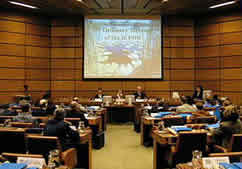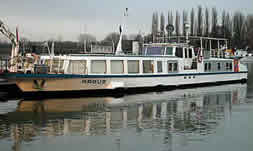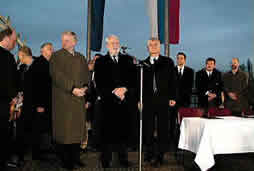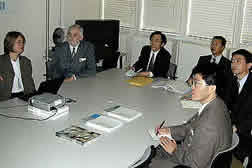 |
The 5th Ordinary Meeting of the ICPDR was held in Vienna on 28/29 November
2002. It was at-tended by all Contracting Parties and the representatives
of the Federal Re-public of Yugoslavia, Ukraine and Bosnia-Herzegovina.
The meeting focused on the achievements and the work programme of the ICPDR
Expert Groups. Particular attention was paid to the implementation of the
EU WFD. The Danube countries clearly committed themselves to respecting
at the national level the agreed timeframes to ensure the overall consistency
of the work and to prepare successfully the roof report for the year 2003.
A new Expert Sub-group on Economics was established to apply economic analysis
to water. To ensure progress in the implementation of EU-WFD, the ICPDR
Expert Groups reviewed the distribution of tasks between them.
As part of the effort to improve water quality and pollution control in
the Danube Basin, the countries asked the responsible experts to negotiate
with the detergent industry agreements on the use of phosphate-free detergents.
An overview of the ICPDR-approved data on water quality in the Danube River
and its major tributaries for the year 2000, including the newly introduced
load assessment programme, is given in TNMN Yearbook 2000.
Prevention of accidental pollution was confirmed as the issue especially
after the Tisza River spills. To harmonize the prevention policy with other
international river basins, the ICPDR adopted "Basic Requirements for
Installations Handling Water Endangering Substances”.
Flood protection and control became a pressing issue after the summer floods
of 2002. Therefore, the ICPDR decided to establish a Flood Protection Expert
Group and charged this body with the task to develop by October 2004 an
Action Programme for Sustainable Flood Protection in the Danube River Basin.
ICPDR Delegations also dealt with cooperation with the UNDP/GEF Danube Regional
Project and assessed its progress. Cooperation with other organisations
and NGOs active in the Danube River protection was highlighted as the right
way to ensure public participation. The 5th Ordinary Meeting of the ICPDR
confirmed the strong commitment of the Danube countries to achieving visible
progress in protecting the water environment of the Danube River Basin.
 |
| The MS Argus |
"MS Argus” laboratory vessel changes owner
On Tuesday, December 3, the State of Hessen (Germany) handed over to Serbia
its laboratory vessel "MS Argus”. The official ceremony took place
in the Rhine harbor of Wiesbaden-Schierstein in the presence of the Serbian
Prime Minister Zoran Djindjic, the Prime Minister of Hessen Roland Koch
and the Executive Secretary of the ICPDR Joachim Bendow. Since 1972, "MS
Argus” has been analyzing the water quality of the Rhine, which has
improved enormously during the last decades. As a cost-saving measure, the
part of the Rhine flowing through the State of Hessen will in future be
analysed using the resources of the State of Rheinland Pfalz, which allowed
the laboratory vessel to be handed over to Serbia. In Serbia, the ship will
be used to analyze the ecological and chemical status of the Danube River
and will indirectly contribute to the implementation of the EU Water Framework
Directive.
 |
| R. Koch, J. Bendow and Z. Djindjic (from left to rigth) attend the handing-over ceremony |
"MS Argus” is not new to the Danube River because it was used during the 3-months Joint Danube Survey organized under the leadership of the ICPDR. During this period contacts between the State of Hessen and Serbia were developed, which led to this outstanding example of international cooperation.
Widely travelled guests visit Permanent Secretariat in November
 |
On 15 November, an expert delegation from Japan visited the Permanent Secretariat.
They were undertaking a ten-day study tour on the Elbe and Danube floods,
with two sub-groups visiting various institutions and damage sites at Prague
and Dresden, and the third team traveling to respective sites in Bonn, Munich,
Salzburg, Vienna and St. Pölten. The teams, composed of experts from
the Japanese Society of Civil Engineering (JSCE), various research institutes
and the Ministry of Transport in Tokio, were interested in the causes and
effects of the August floods in Central Europe, national flood disaster
management, prevention and monitoring systems as well as financial aid programmes,
river management and public information policies.
On 25 November, an expert group from the Dniepr River Basin visited the
ICPDR Permanent Secretariat. Nine biodiversity experts from Ukraine, Russia
and Belarus attended a one-week training workshop organised by Zinke Environment
Consulting, Vienna. At 2,200 km, the Dniepr is the third largest river in
Europe. It is subject to multiple impacts from high industrialisation and
excessive river exploitation. In 1999, UNDP/GEF and the Canadian IDRC launched
a Dniper Basin Environment Programme which hopes to benefit from the experience
in the Danube Basin. The technical experts from the Permanent Secretariat
provided their visitors with an overview of the ICPDR structure and activities,
with special emphasis on transboundary cooperation, the methodology and
results of the Joint Danube Survey and the implementation of the EU Water
Framework Directive in the Danube Region. The UNDP/GEF Danube Regional Project
team presented its activities. Other institutions visited by the Dniepr
group included the Austrian Ministry for Agriculture, Forestry, Environment
and Water Management, the Institute for Water Quality and the Danube Floodplains
National Park east of Vienna.
European Water Commissions to facilitate the implementation of EU water legislation
There are more than 250 transboundary rivers in the world whose basins
are shared by at least two countries. They cover an area of about two-thirds
of the continents and host two-fifths of the world population. 15% of the
countries depend on more than 50% of the water resources of upstream countries.
Not only Iraq, Paraguay, Congo or Botswana but also European Countries such
as Luxembourg, Romania, the Netherlands, Bulgaria and Hungary have more
than 2/3 of their resources coming from neighbouring countries. Appropriately
integrated management of rivers, lakes or aquifers shared by several riparian
countries is, therefore, of strategic significance.
Recognizing this, the European river basin organisations such as the international
commissions for the protection of the Lake Geneva, the Rhine, the Maas,
the Mosel and the Saar, the Odra, the Italian-Swiss Lakes and the Danube
have established regular meetings of their executives and key technicians
to allow them to learn more about each other’s respective organisations,
exchange experiences, compare approaches and methods and develop cooperation.
This year’s meeting took place in Geneva at the end of August, hosted
by the Lake Geneva Commission. The ICPDR was represented by Joachim Bendow,
the Executive Secretary, and Ursula Schmedtje, the technical expert for
integrated river basin management. Topping the meeting’s agenda was
the EU Water Framework Directive. The participants discussed the legal and
technical aspects of the steps leading to a successful implementation of
the Directive. They agreed that international cooperation was the key to
success as was early involvement of stakeholder groups in the process of
creating integrated basin management plans.